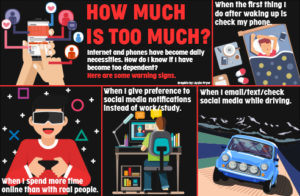By: Aysia Pryor

With net neutrality coming to an end, those of us who depend on technology, mainly our phones, might have a difficult time adjusting. I fall into the category of people who depend on technology, but it is possible to live without it. This idea reminds me of the days where majority of my childhood was spent outside playing. Every now and then I would use the “old-fashioned” box-shaped computer, with Windows ME (Millennium Edition), which took forever to load, so it wasn’t even worth it in the end. The internet wasn’t always reliable, sometimes it would vary on how long it would take for each different website to load.
When I got my first phone, in middle school, I could only use it for texting and calling. My phone had the ability to use the internet, but it wasn’t a part of our phone plan, meaning we had to pay extra for it, and I didn’t want to surprise my parents’ phone bill. If I ever clicked on the application for the internet, I would press the back button multiple times in order to avoid being charged. This meant that I couldn’t type a question into Google and expect an instant answer, via multiple sources. It wasn’t a big deal to me that I couldn’t access the internet on my phone. Instead of using sources from the internet, you had to find the source yourself. If you wanted to know something, you’d have to go and find it. Today, looking up the definition to a word takes eight seconds, at the most. Before we depended on the internet, we had to use a physical dictionary to look for a word and its definition; this also required knowing how to properly spell the word because autocorrect wasn’t around. The end of net neutrality is a reminder of the days when internet access wasn’t unlimited.
I am 21 years old, and I grew up in the midst of the rise of technology addiction. It blows my mind to think that kids now are surrounded by technology and are advised to use technology in classrooms. A 2017 poll found that 50 percent of teens said they “feel addicted” to their cellphones. This statistic isn’t surprising to me because technology devices are our way, as consumers, to feel connected. The average U.S. consumer spends an average of five hours each day browsing the internet.
Growing up in the middle of this rise to technology dependency, I feel as if I had the ability to enjoy my childhood without depending on technology, but I still enjoyed browsing the internet as an alternative. I love net neutrality, and I will be as devastated as the next person if it comes to an end, but we have to learn how to be smarter than our smart devices.







